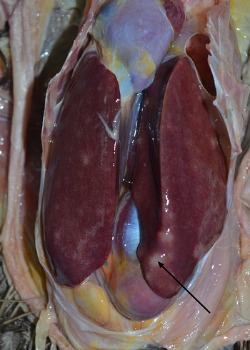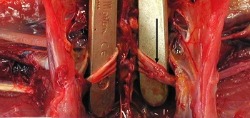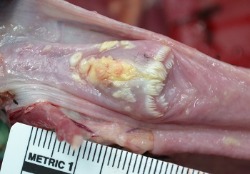What Is Wrong with my Backyard Chickens?
Clinical Connections – Spring 2024
Sonja Jeckel, Senior Lecturer in Farm Animal Disease Diagnostics
Keeping backyard chickens is popular in the UK and numbers are presumed to have consistently increased over the last 20 years. However, precise numbers are unknown as only flocks with more than 50 animals are obliged to be registered with the Animal and Plant Health Agency (AHPA).
Though the general understanding of diseases in backyard chickens has increased among vets in general practice (to fulfil the needs of their clients), specific disease diagnostics in backyard chickens remains challenging due to limited testing options and potentially high associated costs.
Investigating a disease problem in a backyard chicken may be an indicator of a process affecting other birds in the small flock. Therefore, some owners are keen to reach a diagnosis and assess the significance of the disease process for the remaining flock, even after the individual bird affected has passed away.
In such follow-up investigations, the RVC Farm Animal Pathology and Diagnostics Services (RVC- FAPD) supports vets in practice by providing a cost-efficient specialised post mortem examination (PME) service. RVC-FAPD is a partner post mortem provider to APHA and as such PMEs of backyard poultry can be offered at a government subsidised price (currently £46 + VAT).

Investigations
Examples of PME investigations done by us include confirmation of Marek’s disease, one of the more common and serious diseases in backyard chickens. In some of these cases, Marek’s disease was clinically suspected by the submitting vet, as the chickens presented with neurological clinical signs.
Confirmation by PME was sought due to the potential significant implications for the flock. In other cases, chickens just presented with progressive loss of condition and the cause of the demise was unclear at submission.

Some gross PME findings in these cases of Marek’s disease we encountered can be obvious, with lymphoma in various organs, (Fig.1a) but others, including thickening of nerves, can be more subtle and subjective (Fig. 1b). Histopathology, especially of the peripheral nerves (sciatic and axillary), was required to confirm the diagnosis of Marek’s disease.
Another clinical example of our investigations includes diagnoses of infectious laryngotracheitis (ILT); a severe, often fatal respiratory disease of chickens that can affect several backyard chickens in a flock. Often these cases had been associated with a recent history of introduction of new birds. PME findings can be striking (Figure 2), with plugs of caseous necrotic material blocking the laryngeal opening. Histopathology frequently allows for confirmed diagnosis by detecting herpesviral inclusion bodies in the tracheal epithelium. The confirmed diagnosis is significant for the remaining flock with regards to recommendations on vaccinations and new bird introduction.

However, not all of our PME cases in backyard chickens have wider implications – and most owners and submitting vets are a lot happier and relieved about diagnoses like egg peritonitis or adenocarcinoma without any indication for additional underlying serious disease. Even in some of these cases there may be some incidental findings that could provide the submitting vet with better insight into the needs of the flock, such as the presence of lice, mites or nematodes.
The two main vets involved with RVC-FAPD and dissections of backyard chickens are myself and Dr Bernat Marti-Garcia. We are always interested in discussing any potential PME and diagnostic queries in poultry or other farmed animals with vets. You can find further information, including our contact details, on the RVC Pathology and Diagnostic Laboratories web pages.
Please note that we cannot accept any cadavers of birds suspected of having avian influenza (or Newcastle disease). In these cases, you will first have to notify APHA (03000 200 301).
If you are dealing with a tricky clinical case in live backyard chickens, consider contacting the RVC Exotics Service on exoticscamden@rvc.ac.uk for advice.
